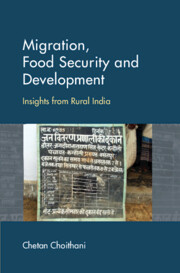Book contents
- Frontmatter
- Contents
- List of Figures, Tables and Boxes
- List of Photos
- Preface
- Acknowledgements
- List of Abbreviations
- 1 Introduction
- 2 Bridging the Disconnect between Migration and Food Security
- 3 Dynamics of Food Insecurity, Migration and Urbanisation in India
- 4 The Context of Migration
- 5 Connections between Food Safety Nets and Migration
- 6 Migration, Remittances, Land and Household Food Security
- 7 Opening the Household Box
- 8 Conclusion
- References
- Index
7 - Opening the Household Box
Migrating Men, Left-Behind Women and Household Food Security
Published online by Cambridge University Press: 22 February 2023
- Frontmatter
- Contents
- List of Figures, Tables and Boxes
- List of Photos
- Preface
- Acknowledgements
- List of Abbreviations
- 1 Introduction
- 2 Bridging the Disconnect between Migration and Food Security
- 3 Dynamics of Food Insecurity, Migration and Urbanisation in India
- 4 The Context of Migration
- 5 Connections between Food Safety Nets and Migration
- 6 Migration, Remittances, Land and Household Food Security
- 7 Opening the Household Box
- 8 Conclusion
- References
- Index
Summary
INTRODUCTION
In India, labour migration is highly gendered. Rigid social and cultural norms restricting women's participation in income-earning activities in distant labour markets means migration is more commonly undertaken by men, leading to a phenomenon of left-behind women. Nationwide data show that male migration is prevalent in regions covering over 200 million people, including places as diverse as coastal Maharashtra and mountainous Uttarakhand. In large parts of the two northern states of Uttar Pradesh and Bihar that account for a significant bulk of migrants in the country, labour mobility is almost exclusively a male-only activity. Strikingly, this migration pattern has persisted for over a hundred years (Tumbe, 2012, 2015a). Independent estimates of the left-behind women are wanting, but rising significance of migration in rural lives means that their numbers may be on the rise and so may be the households headed by them. Some evidence of this shifting gender composition in the familial sphere is provided by the NFHS data that show that in just seven high outmigration states in the eastern and central regions of the country, over 10 per cent of women were not staying with their husbands (Ganguly and Negi, 2010), and that between 1992–93 and 2014–15, women-headed households increased from 9.1 per cent to 14.9 per cent in rural India (IIPS, 1995; IIPS and ICF International, 2017b). Available research shows that women-headed households are at a disadvantageous position in terms of access to land and livestock, agricultural credit and extension services, and assets, and are thus often overrepresented among the poor and vulnerable (Buvinić and Gupta, 1997; King and Mason, 2001; FAO, 2011). Patriarchal systems can confer a gender-based disadvantage to leftbehind women and create more vulnerabilities.
Vulnerability to food insecurity is a key challenge. Indeed, despite women's crucial role as food producers in the farms and food providers in the families, their own food and nutritional needs are often ignored, and they share a disproportionate burden of undernourishment (FAO, 2011; FAO et al., 2020). This discrimination often starts at the household level where social arrangements determining the access to productive economic opportunities and control over household resources often favour men. This results in a weak bargaining position of women with intra-household distribution of food favouring men over women (Sen, 1987), reinforcing gender inequalities in an intergenerational fashion.
- Type
- Chapter
- Information
- Migration, Food Security and DevelopmentInsights from Rural India, pp. 235 - 269Publisher: Cambridge University PressPrint publication year: 2023



